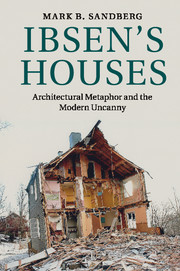1 - Ibsen's uncanny
Published online by Cambridge University Press: 05 April 2015
Summary
Ibsen's reputation as a master of social-realist dramas obscures a dynamic central to his authorship: he is also a master of the uncanny. This assessment will not strike all readers as immediately convincing, so the discussion in this chapter will lay both the theoretical and historical groundwork for that claim. The particular inflection of the uncanny put forward here will provide a framework for several of the later chapters, so it is important to make clear from the start the aspects of the voluminous literature on this subject that are most relevant. Direct applications of the uncanny to Ibsen's work have been fewer still, so my approach will also need some justification and explanation.
A survey of critical thinking on the uncanny by Nicholas Royle provides a glimpse into the wide range of topics now accepted as engaging with the phenomenon in some way. These include a “crisis of the proper,” a “crisis of the natural,” “a commingling of the familiar and the unfamiliar,” a “strangeness of framing and borders, an experience of liminality,” fears of dismemberment or loss of body parts, or the sudden perception of aspects of the self as foreign, to name just a few. These experiences of the uncanny, all of which are essentially varieties of decentering and uncertainty, are typically prompted by encounters with “curious coincidences,” various kinds of “mechanical or automatic life,” tokens of death, or remnants of the past experienced out of proper place and time. In twentieth-century philosophy, the notion of the uncanny as “unsettling” experience has been especially productive and resonant for various thinking about the alienation of the subject, and Royle traces the precedents for his study through Marx, Nietzsche, Freud, Heidegger, and Wittgenstein. Because the uncanny almost always involves the commingling of opposites and the dissolution of borders, it has proven to be an enormously elastic concept with wide resonance in critical theory.
- Type
- Chapter
- Information
- Ibsen's HousesArchitectural Metaphor and the Modern Uncanny, pp. 18 - 55Publisher: Cambridge University PressPrint publication year: 2015



